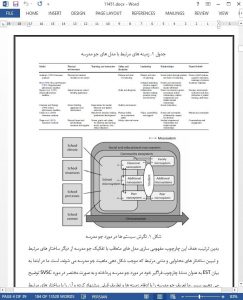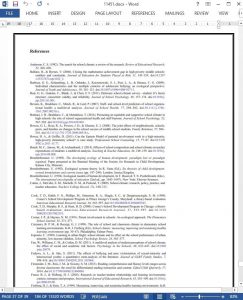Abstract
School climate has been widely examined through both empirical and theoretical means. However, there is little conceptual consensus underlying the landscape of this literature, offering inconsistent guidance for research examining this important construct. In order to best assist the efforts of developing causal models that describe how school climate functions, we propose the Systems View of School Climate (SVSC). This theoretical framework was formed by deconstructing prior models and empirical research on school climate into themes and highlighting their implicit assumptions. Using the SVSC to synthesize this existing literature, school climate is defined as the affective and cognitive perceptions regarding social interactions, relationships, values, and beliefs held by students, teachers, administrators, and staff within a school. School climate is situated within Ecological Systems Theory (Bronfenbrenner 1989) to guide future research in this domain and help specify levels of research or analysis, thereby providing utility as a theoretical framework for future causal models. The SVSC provides a roadmap for research by demarcating school climate from related constructs, suggesting related contextual and structural constructs, and delineating proximal and distal systems which may shape the nature of school climate.
School climate has caught the attention of the US Department of Education as a construct of critical importance (U.S. Department of Education 2014). The government has put forth guidelines on the need to foster school climates that are positive, respectful, and safe. These recommendations are drawn from a substantial research base on school climate (e.g., Mitchell et al. 2009; Gottfredson et al. 2005). School climate is described through theoretical constructs, operational definitions, and taxonomies, and used as a predictor or outcome variable in a vast number of empirical studies. However, a closer examination of this literature reveals some conceptual and theoretical confusion. Notably, there is still a need for a clear, comprehensive, and overarching framework for the study of school climate in order to guide future empirical research. Upon examination, conceptual conflicts are apparent, such that definitions and taxonomies within the same study appear at odds. For example, school climate is described as a complex construct (Anderson 1982) yet is often measured as a unidimensional factor (e.g., Fedewa and Ahn 2011).
Conclusion
The SVSC was developed by deconstructing prior models and empirical research into themes and highlighting their implicit assumptions. A coherent conceptual definition of school climate is provided: School climate is composed of the affective and cognitive perceptions regarding social interactions, relationships, values, and beliefs held by students, teachers, administrators, and staff within a school. School climate is often conflated with related, yet substantively different constructs, such as school context, processes, and structure; although these constructs are part of the microsystem and may relate to school climate, they are conceptually and substantively different from school climate. Conceptual clarity in school climate is critical for construct validity and development of causal models. The SVSC provides this clarity through precise construct explication and differentiation from related constructs. Furthermore, the SVSC provides a systems-based framework to guide development of causal models and empirically test school climate as it relates to other constructs of central importance such as school safety and student achievement.










